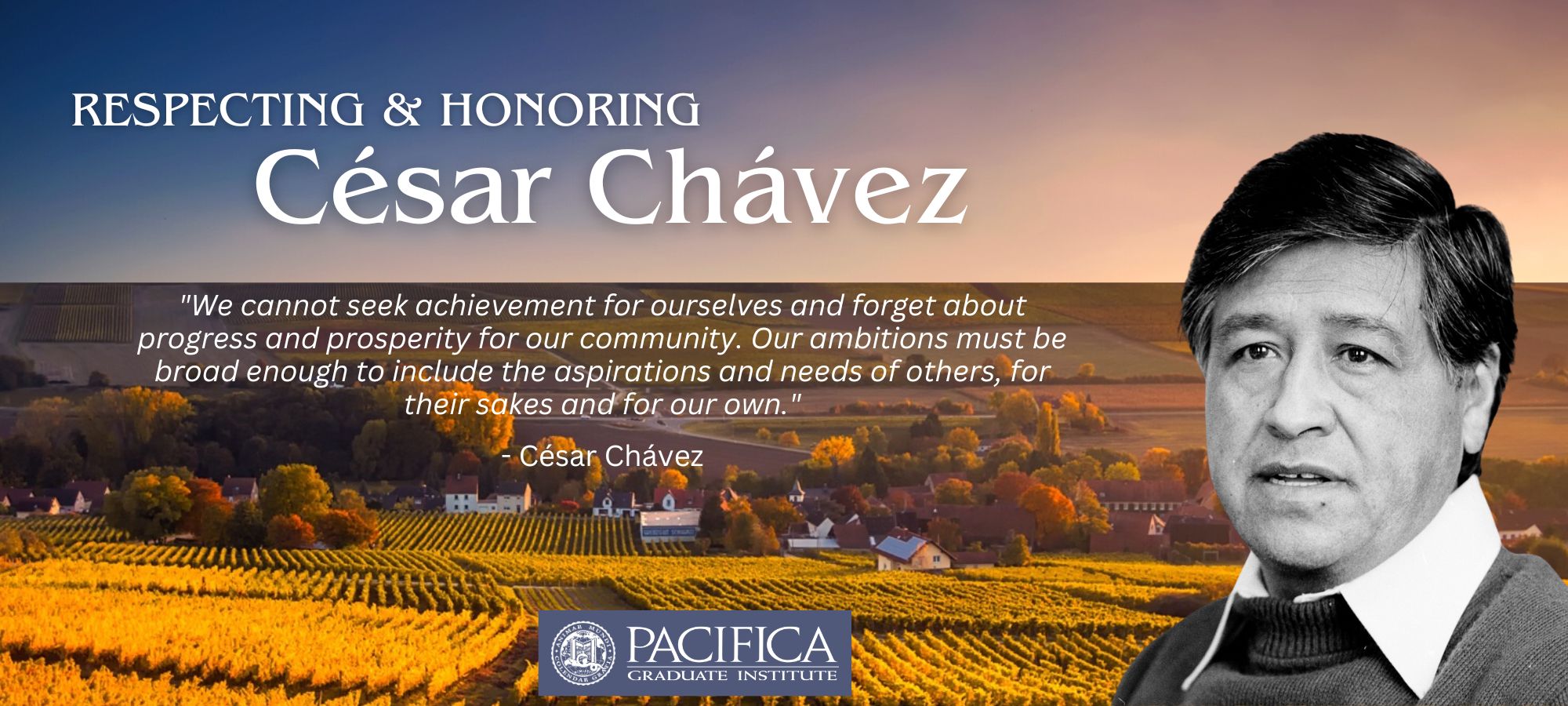by Dr. Leonie H. Mattison,
Pacifica Graduate Institute’s President & CEO
On César Chávez Day, join me in honoring the legacy of a civil rights leader who changed America’s understanding of farm workers; and in advocating for them, he changed American history. The United Farm Workers union would not exist without him, and neither would living wages, humane working conditions, or legal protection for farm workers in California and across the nation.
“The fight is never about grapes or lettuce. It is always about people.” – César Chávez
You might wonder what farm rights activist César Chávez and the President & CEO of Pacifica have in common. My grandparents were farmers. My father tilled our land in Jamaica and grew sweet potatoes, beans, bananas, and all the staple food we ate. My mother sold our produce in the market. My sister is a farmer to this day and has won awards for farming. As a child, I helped my father weed and brought him lunch in the field. As an adult, the power of connecting to nature, walking with my feet in the dirt, and understanding the protection this offers the sacredness of the mind both informs and inspires the mission I’ve undertaken for Pacifica: to make depth psychology accessible to all. Even farmers. Especially farmers.
César Chávez gave a voice to farm workers from marginalized communities. He saw them in the deepest sense, saw their value, the dignity and respect that they deserved. It was a simple but revolutionary idea, that their labor mattered, that decent wages, inclusivity, and community mattered in a world where most people have forgotten where their food comes from. That same simple but revolutionary idea is what drove Pacifica’s founding, that every soul matters, especially those who are coming from backgrounds, experiences, and traumas far different from our own. At Pacifica, we know that healing comes through community, and therefore the importance of being in community, expanding our community, and lifting up everyone’s voices to be heard. Pacifica Soul Promise is rooted in this core understanding, as we seek to broaden the field of depth psychology to include the voices of the entire community. And by community, I mean world.
It’s easy to forget that Santa Barbara and most of the surrounding counties began as farming communities, and to some extent, still are. Many members of our community are the children and grandchildren of those workers whom César Chávez fought for. Pacifica’s own Norma Mesa, Director of Human Resources, shares with us why this day is so important to her:
“As a Latina, I grew up in a Spanish-speaking home. Both of my parents worked in the agricultural fields, mostly in Texas and then in California during the 50s and 60s. They described the working conditions as harsh and painful, with long hours and little pay. When César Chávez co-founded the United Farm Workers, he campaigned for safety, benefits, and improving working conditions and wages. The UFW motto ‘Sí, se puede,’ (‘Yes, we can’) was repeated by my parents during my many stages of life. I carried ‘Si, se puede’ with me throughout my years of getting educated, in my work life, and spiritual journey. It helped me forge on when things seemed impossible. César Chávez was a civil rights and labor activist who taught my parents and the Latino community that we can do it. This is why it is important to me to celebrate César Chávez Day.”
House Farm Workers! is an organization in Ventura that promotes affordable housing, education, and advocacy for the 42,000 workers in that county alone, saying, “These farm workers are critical to Ventura County’s $2 billion-a-year agricultural industry. Without them, crops would not be harvested, and the lush local landscape of green fields and orchards would go untended.” Multiply that by the many other agricultural counties in California, and you begin to understand the magnitude of César Chávez’s mission.
Pacifica is proud to be a community dedicated to social responsibility and full of students, faculty, staff, and alumni doing significant work in their communities and in their research that align with the life and activism of César Chávez:
- The Fieldwork and Research from our Community, Liberation, Indigenous, & Eco-psychologies Specialization (CLIE)
- An interview with Dr. Jenny Escobar, Core Faculty in the CLIE specialization, around her work for social justice
- We also encourage you to explore our Diversity Library Guide to explore reference sources, books, articles, and journals related to diversity, equity, and inclusion
Additionally, for more information on César Chávez and César Chávez Day, visit the César Chávez Foundation page for resources, education, and ways to give back.
On this day when we honor a man who created a national movement for justice from seemingly humble and homespun community activism, I will take my shoes off, walk with my bare feet in the dirt, and remember what it felt like to be a farmer’s daughter bringing him lunch in the field. I hope you will also find a moment to be with nature today, to reflect on the transformative work of César Chávez, and join me in the conviction of our work and the certainty that “Sí, se puede.”

At the helm of Pacifica Graduate Institute, Dr. Leonie H. Mattison (Dr. Lee) serves as President and CEO, guiding an institution defined by transformative education, research innovation, and culturally responsive care for the soul in the world—a mission she has upheld throughout her distinguished career. With leadership experience spanning higher education, non-profit, government, and the private sector, Dr. Lee has innovated organizational and talent development structures, overhauled learning institutions to enhance student access and employee engagement, and spearheaded national public health research and initiatives to improve health outcomes.
Inspired by depth psychological and spiritual approach to trauma recovery, she ingeniously fashioned the T.H.R.E.A.D. healing toolkit following a near-death stroke. The toolkit with its six step T.H.R.E.A.D framework—Think outcomes, Harvest lessons, Release pain, Enlist allies, Adopt a new mindset, Dream of a new self—serves as a transformative guide for self-discovery, healing, and personal growth. Infused with the essence of soulful well-being, it empowers individuals not only to recover but to thrive in life’s journey.
Dr. Mattison is an author, mother, and the first Black woman to lead an institution dedicated to depth psychological and psychodynamic domains. Her bold vision for Pacifica is to make depth psychology universally accessible. She consistently demonstrates her commitment to access, equity, and support for survivors to heal from trauma, invoking joy, faith, and resilience to fulfill her calling. An advocate for student success, women in leadership, and diversity in higher education, Dr. Lee embodies a commitment to caring for the world’s soul one individual at a time.


